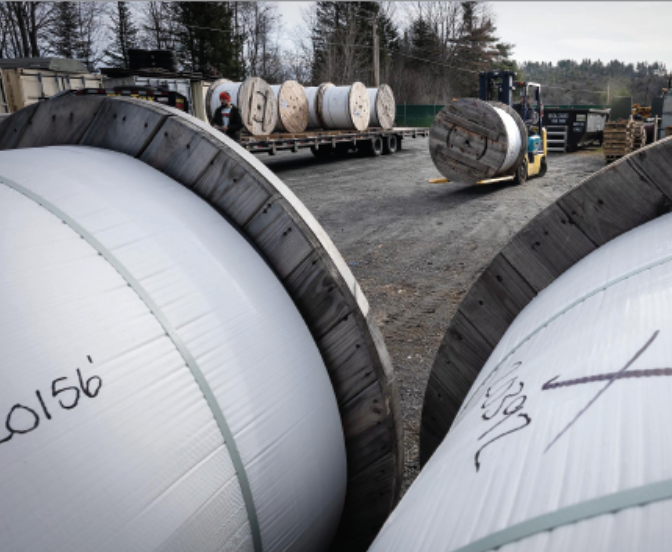
By Fred Thys/VTDigger
Hunting camps in remote areas, off-the-grid houses, summer camps out in the woods — locations like these would have to get broadband service if Vermont taps a huge source of federal funding.
The Vermont Community Broadband Board recently released a draft proposal that would determine how the state would spend $229 million in new federal funding to expand high-speed internet access. However, the money from the federal Broadband Equity Access and Deployment Program comes with a catch: It requires that every unserved address in Vermont be covered by high-speed broadband.
The federal government defines unserved locations as those that get less than 25 megabits-per-second download and 3 megabits-per-second upload speeds.
Until this new pot of federal money became available, Vermont’s goal had been to get all E911 addresses on the electric grid connected to internet service providing at least 100 megabits-per-second for uploads and downloads, according to Ellie de Villiers, president of the Vermont Communications Union District Association. The federal plan aims to cover more locations — just how many is not yet clear.
“Some of the challenge is that we’re now going to have to include some of these locations that we haven’t had to consider before,” de Villiers said. “These are locations that tend to be extremely remote, and the cost to get to them is really high.”
De Villiers said the communications union districts are trying to figure out how to make this work under the new federal rules. Neither de Villiers nor other broadband officials could provide an estimate of how many off-grid sites would need to be included under the federal guidelines.
“It doesn’t make sense to spend $50,000 or $100,000 to get to the one address that someone lives in here two weeks during hunting season,” said de Villiers.
The state is counting on private telecommunications providers to upgrade all the homes that already have cable. For the largely rural regions of the state without access to high-speed internet, Vermont is relying on a strategy of allowing municipalities to band together into communications union districts to build out fiber optic service.
Vermont will prioritize affordability, according to Lucy Rogers, rural broadband technical assistance specialist at the Vermont Community Broadband Board. She said affordability includes the cost of a monthly internet plan but also factors in how much revenue providers would be willing to reinvest to make service more affordable and how building in one area might affect affordability in adjacent areas.
“It’s easy to make the internet affordable in densely populated areas,” said Rogers, a former state representative.
Other criteria for how the broadband board proposes to award contracts include how efficiently they would use the federal funds; whether they would meet fair labor standards; whether projects reflect community will and community input; whether they would be built in coordination with local government and regional planning commissions; whether they would promote equitable workforce development; and whether they would build climate-resilient infrastructure.
Vermont expects to get the federal money next year, according to Rogers. Under the federal guidelines, Vermont and every other state must complete deploying broadband by 2028.
“Of course we’re going to try to get everybody connected as quick as possible, but we don’t control the timeline for when the federal government gives us funds,” said Robert Fish, deputy director of the broadband board.
In a sense, this new influx of federal money could delay when Vermont provides fast internet to everyone.
“In a lot of ways, the earlier federal funds that came through the coronavirus, through CARES and ARPA, were much more flexible,” said Robert Vitzke, executive director of the Vermont Communications Union District Association, referring to the federal Coronavirus Aid, Relief and Economic Security Act of 2020 and the American Rescue Plan Act of 2021. “The state was able to put them directly in use.”
Vitzke called the earlier federal funds a “perfect match” between the federal funding coming in and the program that the state had created.
The federal Broadband Equity Access and Deployment Program was created for states that, unlike Vermont, had no broadband plan, Vitzke said, and yet $229 million has been designated for Vermont, money the state wants to take advantage of.
“This is the big pot of money,” said Vitzke, but it comes with an onerous process that will take time.
Fish argued that Vermont is still well ahead of schedule, and pointed to the progress the CUDs have made:
Southern Vermont CUD, in Bennington County, is expected to have connected all but a dozen or so addresses by this fall.
ECFiber expects to connect everyone in its coverage area of the Upper Valley and central Vermont by next summer.
Lamoille FiberNet, in Lamoille County, and Otter Creek CUD in Rutland County are on track to be more than three-quarters of the way to completion by the end of next year.
NEK Broadband has secured additional federal funds through the U.S. Department of Agriculture’s ReConnect program and is connecting hundreds of customers in the Northeast Kingdom.
Maple Broadband in Addison County, DVFiber in the Deerfield Valley and CVFiber in central Vermont are all in construction and have connected their first customers.
Northwest Fiberworks is expected to begin construction in Franklin, Grand Isle and Chittenden counties in the spring.
Anyone wishing to weigh in on the state’s draft plan can email comments to [email protected], write to VCBB, 112 State St., Montpelier, VT 05620, or call 800-622-4496 by Oct. 15.




